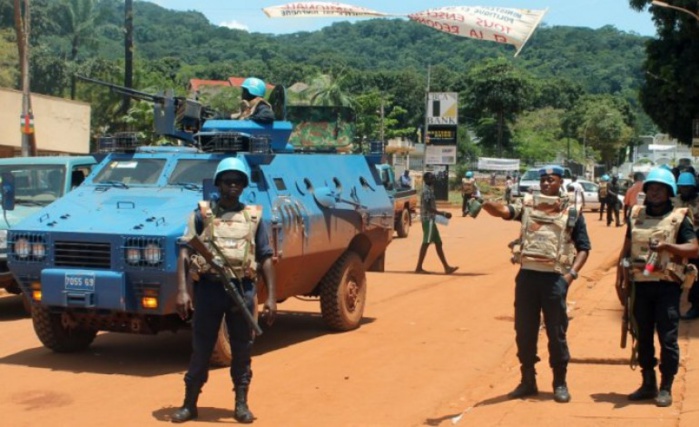Burundi: Akanama gashinzwe amahoro n’umutekano muri UA kafashe icyemezo cyo kohereza ingabo i Bujumbura
/http%3A%2F%2Fwww.igihe.com%2FIMG%2Fjpg%2Fimg_2797.jpg) Akanama gashinzwe umutekano n’amahoro (CPS) k’umuryango w’ubumwe bw’Afurika (UA) kafashe icyemezo cyo kohereza umutwe w’ingabo ugizwe n’ingabo zitanzwe n’ibihugu by’Afurika mu Burundi. Uwo mutwe w’ingabo ukaba ufite inshingano zo kurinda umutekano w’abasivili i Bujumbura. Icyi cyemezo kikaba kigaragaje indi ntera ikomeye umuryango w’ubumwe bw’Afurika ndetse n’umuryango mpuzamahangaa bigaragaje mugushyira igitutu ku kubuyobozi bw’igihugu cy’u Burundi.
Akanama gashinzwe umutekano n’amahoro (CPS) k’umuryango w’ubumwe bw’Afurika (UA) kafashe icyemezo cyo kohereza umutwe w’ingabo ugizwe n’ingabo zitanzwe n’ibihugu by’Afurika mu Burundi. Uwo mutwe w’ingabo ukaba ufite inshingano zo kurinda umutekano w’abasivili i Bujumbura. Icyi cyemezo kikaba kigaragaje indi ntera ikomeye umuryango w’ubumwe bw’Afurika ndetse n’umuryango mpuzamahangaa bigaragaje mugushyira igitutu ku kubuyobozi bw’igihugu cy’u Burundi.
Kohereza uwo mutwe w’ingabo i Burundi bigomba kubanza kwemerwa na leta y’u Burundi n’ubwo bigaragara ko itazabyemera cyangwa se bikemerwa n’abakuru b’ibihugu b’umuryango w’ubumwe bw’Afurika (UA) nk’uko byemejwe numwe mubakozi bakuru b’uwo muryango. Uwo mukozi mukuru wa UA Bwana Bonaventure Cakpo Guebegde yabwiye umunyamakuru w’ibiro ntaramakuru by’abafaransa AFP, aribyo « veritasinfo » ikesha iyi nkuru ko «akanama gashinzwe umutekano n’amahoro kafashe icyemezo ejo kuwa kane taliki ya 17 Ukuboza 2015 cyo kohereza ingabo mu Burundi zo kubungabunga umutekano w’abasivili » ; Bwana Bonaventure Cakpo Guebegde watangaje ayo makuru akaba ari umuyobozi mukuru w’ishami rya UA rishinzwe umutekano n’amahoro y’akarere k’Afurika kagizwe n’ibihugu by’ u Burundi na Congo zombi. Uwo muyobozi akaba yavuze ko umubare w’ingabo zizohereza mu Burundi utaramenyekana.
 Bwana Bonaventure Cakpo Guebegde yagize ati : « Ubu dufite uburyo bubiri bushoboka : ubwa mbere ni uko dushobora kohereza uwo mutwe w’ingabo tubyumvikanyeho na leta y’u Burundi. Uburyo bwa kabiri ni uko tugomba gutegereza ko abakuru b’ibihugu by’Afurika bumvikana kuri icyo cyemezo, ibyo bikaba bisaba ko nibura 2/3 by’umubare w’abo bakuru b’ibyo bihugu bemera ko icyo cyemezo gishyirwa mu bikorwa. Ariko twe icyo twifuza cyane ni uko leta y’u Burundi ariyo yakwemera ko izo ngabo zoherezwa mu Burundi ». Biragaragara ko bigoye ko abategetsi b’u Burundi bazemera ko izo ngabo zijya mu gihugu cyabo cyane ko abo bategetsi bamaze iminsi bamagana ukwivanga k’umuryango mpuzamahanga mu gushakira umuti ikibazo cya pilitiki kimaze amezi 8 mu Burundi ; kwemera ko uwo muryango wohereza ingabo i Burundi bikaba biri kure cyane !
Bwana Bonaventure Cakpo Guebegde yagize ati : « Ubu dufite uburyo bubiri bushoboka : ubwa mbere ni uko dushobora kohereza uwo mutwe w’ingabo tubyumvikanyeho na leta y’u Burundi. Uburyo bwa kabiri ni uko tugomba gutegereza ko abakuru b’ibihugu by’Afurika bumvikana kuri icyo cyemezo, ibyo bikaba bisaba ko nibura 2/3 by’umubare w’abo bakuru b’ibyo bihugu bemera ko icyo cyemezo gishyirwa mu bikorwa. Ariko twe icyo twifuza cyane ni uko leta y’u Burundi ariyo yakwemera ko izo ngabo zoherezwa mu Burundi ». Biragaragara ko bigoye ko abategetsi b’u Burundi bazemera ko izo ngabo zijya mu gihugu cyabo cyane ko abo bategetsi bamaze iminsi bamagana ukwivanga k’umuryango mpuzamahanga mu gushakira umuti ikibazo cya pilitiki kimaze amezi 8 mu Burundi ; kwemera ko uwo muryango wohereza ingabo i Burundi bikaba biri kure cyane ! «Umuvugizi wa leta y’u Burundi asanga akanama gashinzwe amahoro n’umutekano k’Afurika (CPS) kagomba kohereza ahubwo abapererezi mu Rwanda kuko abahungabanya amahoro n’umutekano mu Burundi ariho bava» Ibi bikaba byavuzwe na Bwana Karerwa Ndenzako umuvugizi wungirije wa perezida w’u Burundi Pierre Nkurunziza wabyanditse ku rukuta rwe rwa « twitter ». Abategetsi b’i Bujumbura bamaze amezi menshi berekana ibimenyetso bishinja u Rwanda gucumbikira no gutoza inyeshyamba ziyemeje kugaba ibitero bya gisilikare ku gihugu cy’u Burundi ; izo nyeshyamba zikaba ziyobowe na bamwe mubashatse guhirika leta y’u Burundi ku mataliki ya 13 n’iya 13 Gicurasi uyu mwaka kandi nabo bakaba bacumbikiwe n’igihugu cy’u Rwanda !
«Umuvugizi wa leta y’u Burundi asanga akanama gashinzwe amahoro n’umutekano k’Afurika (CPS) kagomba kohereza ahubwo abapererezi mu Rwanda kuko abahungabanya amahoro n’umutekano mu Burundi ariho bava» Ibi bikaba byavuzwe na Bwana Karerwa Ndenzako umuvugizi wungirije wa perezida w’u Burundi Pierre Nkurunziza wabyanditse ku rukuta rwe rwa « twitter ». Abategetsi b’i Bujumbura bamaze amezi menshi berekana ibimenyetso bishinja u Rwanda gucumbikira no gutoza inyeshyamba ziyemeje kugaba ibitero bya gisilikare ku gihugu cy’u Burundi ; izo nyeshyamba zikaba ziyobowe na bamwe mubashatse guhirika leta y’u Burundi ku mataliki ya 13 n’iya 13 Gicurasi uyu mwaka kandi nabo bakaba bacumbikiwe n’igihugu cy’u Rwanda !Ingabo zigomba koherezwa mu Burundi zizava mu mutwe w’ingabo z’ibihugu by’Afurika y’iburasirazuba wateguriwe gutabara aho rukomeye (EASF), uwo mutwe ukaba ubarirwa muri imwe mu mitwe y’ingabo z’Afurika zateguriwe gutabara (FAA : Force Africaine en Attente) nkuko byatangajwe na Bonaventure Cakpo Guebegde. Ibihugu 10 akaba aribyo byoheza ingabo zabyo muri uwo mutwe wa EASF aribyo : Uburundi, Ibirwa bya Comores, Djibouti, Ethiopia, Kenya, Uganda, u Rwanda, Seychelles, Somalie na Soudan. Mu kwezi k’Ugushyingo umuryango w’abibumbye nawo washyize ahagaragara igitekerezo cyo kohereza ingabo mu Burundi ariko ukohereza igice kimwe k’ingabo zawo ziri mu Burasirazuba bwa Congo arizo « monusco » mu gihe umutekano wakomeza kuba mubi i Bujumbura.
AFP
